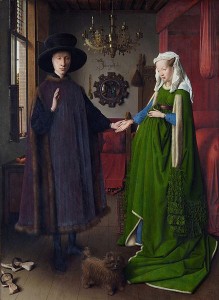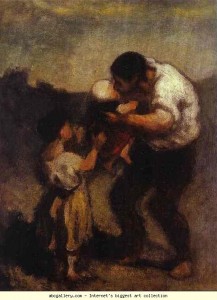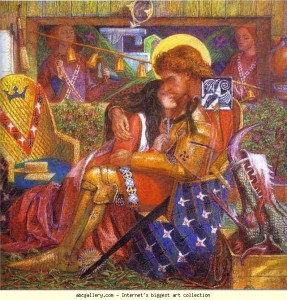Although we’d much rather discuss something else, the debate over the redefinition of marriage continues to hold the public’s attention. Furthermore, it does not seem that the case for the traditional definition of marriage can even receive a fair hearing. Is it so ridiculous to suggest that we need an institution which insists that our children matter more than we do? Have we completely lost sight of the connection between sex and procreation? After all, there is a rather strong correlation between having a child and having had sex; there is an even stronger correlation between being human and having a biological mother and father. Whatever the case, it seems that the secular world does not understand the traditional view of marriage. So, we hope that these “Quick Points” might shed a little more light than heat, help others understand our position a little better and demonstrate that it is possible to rationally disagree with the arguments for same-sex marriage.
1) The traditional, or conjugal, view of marriage is that marriage is the exclusive, lifelong, sexual and personal union of a man and a woman.
2) The argument for the conjugal definition is quite simple: if there was no intrinsic link between sex, procreation and family there would simply be no need for society to promote and protect faithful, permanent, lifelong sexual relationships. Put another way, the traditional view of marriage recognises the basic facts of life: that sex is not merely for pleasure, affection and romance. We cannot escape the fact that sex aims at procreation. Therefore, society has encouraged and protected sexual relationships which are suitable for procreation. That’s the point of marriage.
3) Marriage gives sexual relationships a very definite purpose: to create a union which can create new life and support new families. It is astonishing that we have to remind people of this; but humans naturally seek to reproduce and nurture their children. Marriage aims to order those instincts to a specific end. Marriage is an institution which places normative demands on sexual partners so that children will be raised by parents who will stay together for life.
So this is not a debate about “marriage equality” : it is a debate about redefining the nature and the purpose of the institution of marriage.
Historically, and, in my view, rightly, marriage has been understood as the distinctive and distinctively valuable form of human association that is oriented to procreation and would naturally be fulfilled by the spouses’ having and rearing children together. It is a comprehensive (and thus conjugal) bond inasmuch as it unites persons not merely at the level of hearts and minds, but in the bodily dimension of their being as well. In this way, it differs from ordinary friendships and other non-marital forms of companionship. And it requires commitments of exclusivity (“forsaking all others”) and permanence (“till death do us part”). Robert P George
 4) Sexual relationships between men and women produce children; children naturally desire a loving relationship with their biological parents; biological kin find it easier to form deep emotional bonds. It would be better, by far, if every family was founded by a man and woman committed in a caring, exclusive, lifelong relationship.For this reason, sexual relationships are never merely private affairs. Society, culture and law have an interest in promoting, maintaining, protecting and supporting relationships which are suitable for creating, sustaining and raising the next generation. This is the only substantive rationale for marriage.
4) Sexual relationships between men and women produce children; children naturally desire a loving relationship with their biological parents; biological kin find it easier to form deep emotional bonds. It would be better, by far, if every family was founded by a man and woman committed in a caring, exclusive, lifelong relationship.For this reason, sexual relationships are never merely private affairs. Society, culture and law have an interest in promoting, maintaining, protecting and supporting relationships which are suitable for creating, sustaining and raising the next generation. This is the only substantive rationale for marriage.
5) It makes sense, then, that our laws should seek to honour, promote and defend exclusive, life-long partnerships between men and women. This is why marriage has been promoted as desirable and honourable relationship.
Of course, sex can be pleasurable and the requisite for reproduction. But this intense attraction to one another over time serves perhaps an even larger purpose. Blankenhorn notes it is the couple’s ongoing emotional entanglement and interest in one another that helps to create the couple that will raise the child. Ongoing sexual interest brings the father into the mother-child dyad. It promotes bonds between parents. It helps to establish a particular family structure: a lasting pair bond that bridges the sexual divide and creates fathers for children. “Mother Bodies, Father Bodies How Parenthood Changes Us from the Inside Out” (Institute of American Values)
6) Furthermore, while marriage is the best way to bring children into the world it also serves other deep purposes. It is the nucleus of a new family and a linchpin which connects two wider families together in the task of raising the next generation. The ceremonies surrounding marriage remind us of the power and responsibility of sexuality – that sex is not only for pleasure or affection, but for creating new life. Marriage recognises the importance of sexual complementarity; it is for so much more than celebrating a couple’s love or solidifying their commitment.
What made marriage unique was the way it brought together in a single institution a whole series of essential human activities: sex, reproduction, companionship, love, responsibility for the welfare and nurture of those we have brought into being, and responsibility for their education.”–Rabbi Jonathan Sacks
7) It is a bad idea to have a law which would replace “fatherhood” and “motherhood” with “parenthood.” The institution of marriage recognises that – in the absence of cruelty or abuse – a child naturally desires to have their father and mother in their lives.
8) The conjugal definition of marriage precedes Christianity and developed independently of Judaeo-Christian tradition. Socrates, Plato, Aristotle, Xenophanes, Musonius Rufus and Plutarch all accepted definitions of marriage that excluded same-sex relationships. They did so in societies that tolerated (and even promoted) same-sex relationships, so their arguments cannot be attributed to “homophobia” or dismissed as the products of religious bigotry.
9) Everyone has a definition of marriage which prohibits certain people from marrying. For example, most societies will prevent close blood relatives from marrying (even, say, if the couple are too old to have children). Every society places age restrictions on marriage. So it is not intrinsically oppressive, or even illiberal, to hold a definition of marriage which excludes certain relationships in principle.
10) Those defending the traditional definition of marriage often point out that we would not marry siblings or those in polyamorous relationships. This is not to argue that homosexual partnerships are morally equivalent to such bizarre sexual bonds! Furthermore, very few would want to enter incestuous or polyamorous relationships, even in the most permissive culture. Therefore, it is very unlikely that there will ever be public pressure to recognise such relationships. This is not to argue from a feared slippery slope.
Everyone is in favor of marriage equality. Everyone wants the law to treat all marriages equally. But the only way that one can know whether a law is treating marriages equally is to know what a marriage is. Every marriage law will draw lines between what is a marriage and what is not a marriage. If those lines are to be drawn on principle and are to reflect the truth, one must know what sort of relationship is marital, as contrasted with other forms of consenting-adult relationships Heritage Centre
11) It follows from point 10, however, that everyone acknowledges that mere attraction and romantic love are not enough for marriage.
12) It is also worth pointing out that if marriage was merely about celebrating love and commitment, there would be no logical, principled reason to forbid polyamorous marriages or to forbid those in incestuous relationships from marrying (provided that they would not have children with each other). To repeat, this is merely a point about the logic of the revisionist position; it is not a prophecy about the social consequences of redefining marriage!
13) The point in 10 is that by reflecting on the types of relationship that everyone would exclude in principle from marriage, we can clarify the purpose of marriage. Incestuous and polyamorous relationships are not suitable for marriage because they are not the types of relationship which are suitable for procreation.
 14) This does not mean that marriage exists merely to make babies! In the absence of cruelty or abuse, children desire their parents to be deeply, permanently committed to one another. The lifelong union of a man and a woman provides a linchpin for holding a family together. So any life-long, permanent, exclusive union between a man and a woman meets the requirements of marriage; a man and woman in such a relationship could wish to have (or wish that they could have had) children. Sex, romance, affection and love create a couple who could, in ideal circumstances, create and raise the child. Any such relationship is an instance of an ideal which society should honour, protect and promote.
14) This does not mean that marriage exists merely to make babies! In the absence of cruelty or abuse, children desire their parents to be deeply, permanently committed to one another. The lifelong union of a man and a woman provides a linchpin for holding a family together. So any life-long, permanent, exclusive union between a man and a woman meets the requirements of marriage; a man and woman in such a relationship could wish to have (or wish that they could have had) children. Sex, romance, affection and love create a couple who could, in ideal circumstances, create and raise the child. Any such relationship is an instance of an ideal which society should honour, protect and promote.
15) If we legally redefine marriage to include homosexual couples, the law will no longer recognise it as a social institution designed to create and nurture and love the next generation. “Marriage” would have no other purpose than to compel society to respect romantic love. Marriage would no longer be a covenant between the generations; it would be little more than a contract between consenting adults; a contract which could (or even should) be terminated when one partner ceases to find that relationship satisfying.
Marriage connects people and goods that otherwise tend to fragment. It helps to connect sex with love, men with women, sex with babies, and babies with moms and dads. Social, cultural, and legal signals and pressures can support or detract from the role of marriage in this regard. Heritage Centre
16) Churches and some religious organisations might be granted “exemptions” from performing same-sex ceremonies. However, a revision in the law would compel many people to honour and recognise a new form of relationship in their public lives, no matter what their spiritual or moral convictions are. This law would tell Jews, Sikhs, Muslims and Christians that they are wrong: sex is not for the creation of new families, but can have whatever meaning we attach to it. In the long run, some loss of religious liberty is inevitable.
17) In a civil society religious freedom means more than an exemption from having to perform certain ceremonies – eg. same-sex marriages – for the state. It includes the freedom to publicly express and rationally defend one’s most fundamental ethical concerns. Yet the rhetoric which drives the campaign for redefining marriage does not reassure religious communities. Politicians can casually compare those who defend the traditional definition of marriage with those who imposed apartheid on South Africa! If support for conjugal marriage really is equivalent to racism then the state has a duty to drive it from the public square.
 18) Proponents of “gay marriage” argue that the traditional definition of marriage grants some couples rights which are withheld from same-sex couples. Examples cited include the right to time off work to care for a spouse or the right to be considered next of kin for emergency medical decisions. One reply is that states could easily grant these rights through civil partnerships. In any case, no-one is arguing that we should extend the rights of married couples to those living in stable, loving, non-sexual relationships.
18) Proponents of “gay marriage” argue that the traditional definition of marriage grants some couples rights which are withheld from same-sex couples. Examples cited include the right to time off work to care for a spouse or the right to be considered next of kin for emergency medical decisions. One reply is that states could easily grant these rights through civil partnerships. In any case, no-one is arguing that we should extend the rights of married couples to those living in stable, loving, non-sexual relationships.
It is too easy to forget that sexual partnerships are not the only form of family life. For example, siblings can live together in a domestic relationship; an elderly parent might live with one of their children. Indeed, such domestic relationships can exemplify admirable qualities, can be socially beneficial, are surprisingly common, and can provide suitable environments for fostering and adoption. However, they are not marriages and should not be equivalent to marriage in law.
All this is summarised in an excellent video by the Iona Institute



